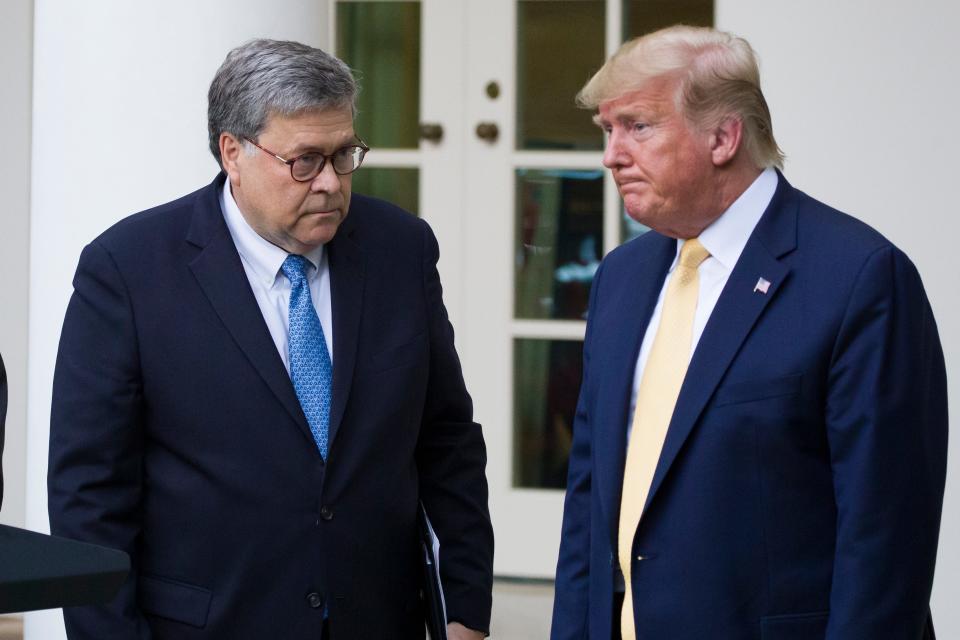Federal lawyers are accountable to ethics and the public, not Donald Trump and Bill Barr
President Donald Trump claims he has an “Article 2" that lets him do whatever he wants and gives him the right to interfere in criminal prosecutions. He reasserted this supposed right in response to Attorney General William Barr’s recent public complaint that Trump’s tweets about various criminal cases were making his job impossible.
Trump is simply wrong. Whatever constitutional powers he might have over his executive branch subordinates, the prosecutorial independence of the Department of Justice is beyond his reach.
Before I get started, let me make it clear that this has nothing to do with democracy. This is about ethics, and it is immaterial whether 51% of people are in favor of what I am going to say or whether 99% are against. It isn’t something you get to vote on. If standing up for ethical behavior in the face of popular opposition makes me “an elite,” then I will proudly wear that label until the fever passes and the rest of you come to your senses.
I am confident that virtually every lawyer reading this will completely agree with me. This will all sound arcane to the average person, but it’s something drilled into lawyers from their first day in law school. There is a reason that the main line of defense against Trump’s attacks on our institutions has been Republican lawyers he appointed himself.
Ethics rules bind all lawyers
The president’s inability to influence criminal prosecutions does present a constitutional issue, but not the one most people imagine. It’s not about the executive power. It’s about the separation of powers. Every American lawyer, including every lawyer in the Justice Department, is, first and foremost, an officer of the court and a bar-card-carrying member of the judicial branch. The very definition of a lawyer is someone who has been admitted by a court to practice law. The privilege of practicing law comes with ethical rules that bind all lawyers, whether they work for the federal government or not, and Supreme Courts disbar lawyers every day for violating them.
Trump justice:The president is using his office to reward friends, punish enemies and tarnish America
Most of these rules boil down to a handful of basic principles. For example, lawyers have a duty to exercise independent judgment, especially when appearing in court, and they have a strict duty to act in their client’s best interest.
This means, in part, not taking orders from the person who pays your salary if those orders aren’t in your client’s interest. It also means not taking orders even from your client if those orders conflict with your other ethical responsibilities. Every lawyer has had to tell a client “no” on occasion, and a fair number of us have had to “fire” a client who insisted that we do something we believe would be unethical.

Trump is no different. He may be doing the hiring and the firing, but the president isn’t the Department of Justice’s client.
Prosecutors have an unusual independence in our system of justice. Their client is the public, even justice itself. While these seem like abstractions, they are powerful guides to enforcing the law. We should all agree that impartial justice — untainted by conflicts of interest, politics or favoritism — is in the public’s interest and that prosecutors are duty-bound to defend it, despite the pressures brought to bear in any given case, whether those pressures come from the news media or the president.
Independent judgment is required
The DOJ lawyers who removed themselves from the Stone case were fulfilling their ethical obligations, no more, no less. Their independent judgment did not allow them to support the change in the sentencing recommendation demanded by their superiors, so they had no choice but to refuse to file it.
President Jimmy Carter's attorney general, Griffin Bell, once quoted Carter as explaining prosecutorial independence this way: “I can remove the attorney general, but I cannot tell him who to prosecute. I cannot tell him who not to prosecute.”
While Carter was specifically referring to the attorney general, this ethical independence applies to every lawyer in the Department of Justice, right down to the line prosecutors appearing in the courtrooms.
Punting on a challenge: House and Mueller spectacularly failed to rein in Trump. That's going to haunt America.
Lawyers, including prosecutors, often have supervisors just as there is a chain of command in the military. But even the lowliest lawyer fresh out of law school is ethically required to exercise independent judgment. Just as soldiers have a duty to disobey an illegal command, prosecutors should not follow political orders in a criminal case, even if the person doing the ordering is the attorney general himself.
To all the federal line prosecutors and DOJ attorneys being pushed to act outside their ethical comfort zone: Do the right thing. You are standing in the gap and ensuring that, in America, justice must be done without fear or favor. There is no law firm in the country — at least no law firm you would want to work for — that does not respect and appreciate integrity under fire.
Whatever President Trump may tweet, history and your fellow lawyers will judge you kindly.
Chris Truax, an appellate lawyer in San Diego, is a legal adviser to Republicans for the Rule of Law and a member of USA TODAY's Board of Contributors.
You can read diverse opinions from our Board of Contributors and other writers on the Opinion front page, on Twitter @usatodayopinion and in our daily Opinion newsletter. To respond to a column, submit a comment to letters@usatoday.com.
This article originally appeared on USA TODAY: Trump and Barr can't dictate to federal prosecutors bound by ethics

